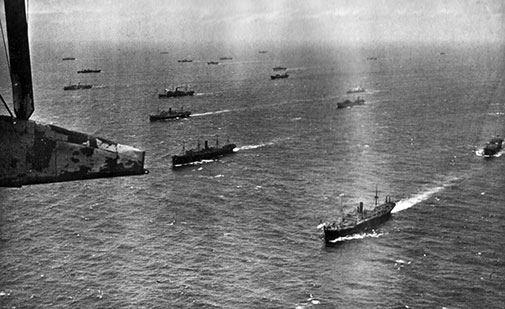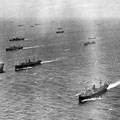The German Navy's U-boat campaign in the Battle of the Atlantic could have been far more effective if it was conducted in a less centralised way and with a less hero-oriented military culture, according to new analysis.
 Allied shipping convoys were frequently targeted by German U-boats during WWII.
Allied shipping convoys were frequently targeted by German U-boats during WWII.
The Battle of the Atlantic was one of the longest and most bitterly fought conflicts of World War II. It saw the German navy, predominantly the U-boat submarines, pitted against the allied naval fleets, particularly the Royal Navy, with the objective of closing down the shipping lanes which allowed food, war materials and other resources to flow into Britain from the United States and elsewhere.
Effective
Researchers in the Department of Mathematics at York and York St John University's School of Humanities say the German Navy's U-boat campaign could have been far more effective had it been subject to operational research and if the military culture was less focused on individual heroes and was decentralised.
Throughout the entire Battle, the Kriegsmarine maintained broadly the same tactic of using U-boats to infiltrate the allied convoy's escort screen, then picking off individual ships from within the convoy.
Concerned
The Allies, who studied tactics carefully, were concerned about the possible success of a different tactic - known as 'browning' - which would have seen the German U-boats standing off the allied fleet and torpedoing entire convoys from a safe distance.
The teams at York took the original pen and paper analyses of browning attacks conducted by the Royal Navy during the war as their starting point, alongside additional contextual archival documents and post-war analyses. They used a computer simulation to compare this approach to the actual tactics that were used to show whether the Allies' concerns could be substantiated.
Difference
Would this altered tactic have made a difference? Professor Niall Mackay, who was part of the team behind the research, believes that adopting the browning tactic, while not changing the ultimate outcome, might have lengthened the battle, and subsequently the war.
He said: "Browning would have made an enormous difference for the German navy. It would have made large convoys unviable, counterintuitively being much less wasteful of the torpedoes the U-boats carried, and much safer for the U-boats.
"This probably wouldn't have stopped the Allies prevailing in the end, but it could have made earlier German success greater and longer-lasting, perhaps through all of 1943, which would have made the Allied invasion of northern France in 1944 (D-Day) impossible."
Turning point
The D-Day landings in June of that year were a turning point in the war which saw hundreds of thousands of allied troops landing on the beaches of Normandy in a matter of days. The event gave the allies a vital toe-hold in Europe, leading to the liberation of France later that year, with the war in Europe ending in May 1945.
Professor Mackay says the admiralty were fully aware that such a change of tactic could present serious difficulties for the allied fleet thanks to an operational research study carried out by the Royal Navy. But the German commanders, having made no such studies, pursued their tactic until the massive loss of 41 U-boats in May 1943 effectively secured the Allies' dominance of the Atlantic.
Culture
Peter Lloyd, an operational researcher in the defence industry who wrote the computer battle simulation says "In the end, it was the Nazi's own supremacist culture that prevented them forcing a different outcome in the Battle of the Atlantic, and even the wider war.
"The Germans might have won a temporary victory in early 1943 if they had used their U-boats to target convoys at a distance under the control of a local flotilla commander," he says.
"But they didn't do this because they didn't have a culture where scientists could analyse the combat and advise commanders on the best way to win, as the British, Canadians and Americans did."
Further information:
- Professor Niall MacKay
- Peter Lloyd, (PhD student and operational researcher)
- Dr Christopher Price (York St. John University)











